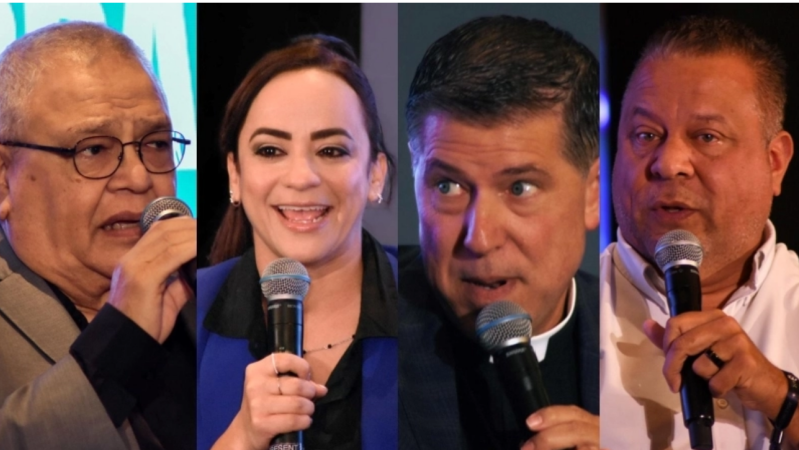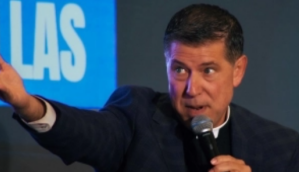
In an increasingly fragmented media landscape—where audiences divide their attention between traditional television, social media, and countless streaming platforms—a panel of renowned communicators gathered at the Media Music Marketing Summit in Miami, FL, to discuss a crucial challenge: how to unite the community and deliver an impactful message “from Prime Time to the Timeline and back.”
The conversation, moderated by Rochy Cantillo, revealed that beyond technology, the key lies in a deep sense of purpose and ministry.
The panel featured Tayhana García, Univision 23 journalist and 13-time Emmy Award winner; Father Alberto Cutié, one of the most recognized figures in Hispanic radio and television; Ray Cruz, content director at La Poderosa 990 AM; and Melvin Rivera, a pioneer of Spanish-language podcasting. Together, they shared their experiences transitioning from mass media to digital niches, agreeing that every screen represents an opportunity to serve.
Journalism as Social Work and Ministry
Tayhana García opened the discussion by emphasizing her view of journalism as a calling to serve. “For me, journalism is social work,” she said, describing how her investigative reports have led to tangible change—such as new laws protecting residents from corrupt homeowners’ associations or resolving urgent community issues.
She recalled the story of an apartment building for seniors who had gone months without air conditioning in Miami’s intense heat. “They called me, and I immediately contacted city hall and local officials… that same day, those residents had air conditioning again,” she said.
For García, being a Christian professional in a secular environment is not a contradiction but a mission. When asked why she works in secular news, her answer is firm: “This is my ministry. God put me there to bring good news in moments of hardship. When a woman loses her husband, when a mother loses her child—I’m there to pray with them.”
From Television as a “Cross” to a Mass Ministry

Father Alberto Cutié, known to millions as “Father Oprah,” shared a surprising story about how his media career began. “I never wanted to be on television,” he admitted, explaining that his superiors sent him to a Telemundo audition. At first, he saw it as a burden that pulled him away from his parish work. “For me, it was a cross—it was hard to leave what I loved to spend hours in a dark studio,” he said.
His perspective shifted one day at a stoplight in Hialeah, just before recording his first live show. In a sincere prayer, he told God, “Lord, you’ve placed me in this. If this is your will, I’ll do it. If it isn’t, I don’t want it.”
From that moment, he understood his purpose. Soon, he began receiving letters from people across Latin America who had returned to the church and their faith because of his program. “I realized that God had put me there,” he said, adding that even the media scandals he faced became opportunities for others to draw closer to God.
Secular Evangelism and Reinventing Radio
Ray Cruz, from La Poderosa 990 AM, spoke about the internal conflict many believers experience when working in secular media. He recalled a time when he almost “threw in the towel,” feeling torn between religious expectations and his professional mission.
But one word from God changed his outlook: “The Lord told me, ‘Don’t be ashamed of what I created, because I formed your character.’” That moment led him to embrace what he calls “secular evangelism.”
Cruz explained that while traditional radio clung to old formats, he and his team chose to innovate digitally, creating an essential synergy between both worlds. “Social media gives you presence, traditional media gives you credibility—but apart, they don’t work. They have to work together,” he concluded.
Podcasting and the Key Tool for the Future
Melvin Rivera, regarded as a podcasting pioneer, offered an audience-centered perspective. He stressed that the most important factor isn’t the platform itself, but understanding what the audience truly needs. “The most important tool is knowing what your audience needs and uses,” he said.
When asked about the essential tools for today’s creators, Rivera surprised the panel by naming artificial intelligence as the most important. While it comes with risks and limitations, he explained, AI—used wisely—can transform the way content is researched, created, and distributed, becoming an invaluable “assistant” for communicators.
A Call to Reclaim Creative Power
The panel closed with a shared conviction: regardless of the platform, a Christian communicator’s purpose is to share messages that build up, transform, and serve others.
Ray Cruz offered a stark closing reflection: “Let’s stop giving creative power to the devil. God created all the arts—the devil just took them—but it’s up to us to reclaim and use them.”
That call to action resonated as the event’s central theme: today’s mission extends across every screen, and it is the responsibility of believers to engage them with excellence, creativity, and an unwavering sense of calling.
Original reporting by Diario Cristiano, Christian Daily International's Spanish edition.





